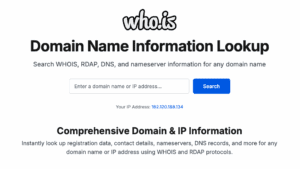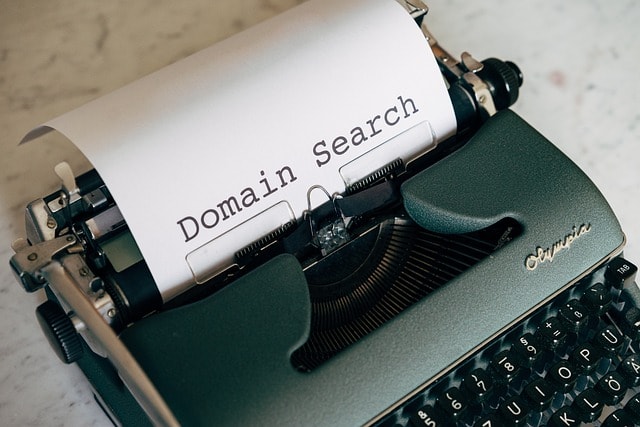Securing a high-value domain name for your business can be a complex process. A common complication is when buyers want to keep their name out of proceedings. NameExperts.com Director Joe Uddeme explains how it’s done.
What is Anonymous Domain Registration?
Anonymous domain registration is a service that allows individuals and businesses to register a domain name without revealing their personal details in the public WHOIS database. Instead of displaying the domain owner’s personal information, such as name, address, and contact details, the registration uses generic proxy details. This approach provides an additional layer of privacy and security, ensuring that your personal information remains confidential.
Adding domain privacy can anonymize ownership details in the WHOIS database, thus enhancing security and confidentiality. For the domain name buyer, this can be a godsend.
Anonymous domain registration is particularly valuable for protecting personal information, preventing unwanted solicitations, and maintaining confidentiality in sensitive situations. Domain ownership privacy is maintained through anonymous registration, which conceals personal information from the public WHOIS database, safeguarding the identity of domain owners against potential threats and unsolicited communications. Using a domain privacy service further ensures that your personal details are kept private and secure.
Key takeaways:
- Anonymous registration comes with many benefits
- Understand the role of WHOIS and regulatory issues
- Top tips to boost security and anonymity
- Working with an experienced domain broker can simplify the process

Benefits of Anonymous Domain Registration
Registering a domain name anonymously offers numerous benefits, including:
-
- Protection of Personal Information: Anonymous domain registration keeps your personal details, such as name, address, phone number, and email ID, private. This prevents your information from being publicly accessible in the WHOIS database. Additionally, domain privacy protection services can further obscure your personal information during domain registration. Using a domain privacy service ensures that your personal information remains hidden from public view.
-
- Prevention of Spam and Unwanted Solicitations: By withholding ownership information, anonymous domain registration helps you avoid unsolicited communication and spam.
-
- Enhanced Security: Anonymous registration adds an extra layer of security against cyber crimes like ransomware attacks and domain hijacking. The domain owner plays a crucial role in maintaining security and privacy by ensuring that their contact information is protected.
-
- Confidentiality: It allows you to maintain secrecy in sensitive situations, such as buying premium domains – or selling them – without revealing your identity.
-
- Emotional Pricing Elimination: Anonymous transactions eliminate emotional pricing by the seller based on the buyer’s identity and intention.
-
- Discreet Domain Procurement: Companies can discreetly procure domains for internal products, brand expansions, or mergers without tipping off competitors.
Understanding the WHOIS Database
What is the WHOIS Database?
The WHOIS database is a publicly accessible repository that stores information about registered domain names. Managed by the Internet Corporation for Assigned Names and Numbers (ICANN), this database contains essential details about domain owners, including their name, address, phone number, and email address.
The primary purpose of the WHOIS database is to provide transparency and accountability in the domain name registration process. It allows users to look up information about a domain name and its owner, ensuring that the domain registration landscape remains open and trustworthy.
Risks of Public WHOIS Data
While the WHOIS database serves an important role, having personal details publicly available can pose several risks for domain owners:
-
- Spam and Unsolicited Contacts: With personal information readily accessible, domain owners may find themselves inundated with unwanted emails, phone calls, or physical mail from marketers and spammers.
-
- Identity Theft: Cybercriminals can exploit the information in the public database to steal or hijack a domain, leading to potential financial and reputational damage.
-
- Privacy Breaches: Publicly available personal information can be used to compromise a domain owner’s privacy and security, making them vulnerable to various forms of cyber threats.
By understanding these risks, domain owners can make informed decisions about protecting their personal details through anonymous domain registration and other privacy measures.

Why Choose Anonymous Domain Registration?
Anonymous domain registration is a crucial step in protecting your personal information and maintaining online privacy. By choosing anonymous domain registration, you can ensure that your personal details, such as name, address, phone number, and email ID, are not publicly accessible in the WHOIS database. This is particularly important for individuals and businesses that value their online privacy and want to prevent unwanted solicitations, spam emails, and identity theft. By keeping your personal information private, you can enjoy peace of mind knowing that your online presence is secure and your identity is protected.
How to Register a Domain Anonymously
There are several methods to register a domain name anonymously, including:
-
- Using a Domain Registrar that Offers Anonymous Registration: Services like Namecheap or Google Domains provide options for anonymous domain registration. Additionally, some registrars offer a free domain name with their services, which can be an added benefit.
-
- Utilizing a Proxy Service: Services like Domains by Proxy or Uniregistry can mask your personal information, ensuring it remains private.
-
- Registering Through a Third-Party Service: Using a VPN or a domain anonymization service can help you register a domain without revealing your identity.
-
- Using a Domain Broker or Marketplace: Engaging a domain broker or using a domain name marketplace can help maintain anonymity during the registration process.
-
- Some registrars offer a free domain with hosting packages, which can lower overall costs and enhance the appeal of their services.
-
- Using a Domain Privacy Service: A domain privacy service can protect your personal information by replacing it with the service’s contact details.
Verifying Domain Privacy Protection
To verify whether your website has domain privacy protection, you can easily check the WHOIS database by entering your domain name in the search bar. Look for a generic name, contact address, or email address that forwards messages to you. If you find any of your details apart from what’s in the Domain Information panel, consider enabling domain privacy. You can also check with your domain registrar to see if they offer domain privacy protection services. Ensuring that your domain has privacy protection is a simple yet effective way to safeguard your personal information and maintain your online privacy.
Security and Protection
Anonymous domain registration provides an additional layer of security and protection for domain owners. By keeping personal information private, individuals and businesses can:
-
- Protect Against Cyber Threats and Unwanted Exposure: Keeping your personal details hidden helps safeguard against cyber threats and unwanted exposure.
-
- Prevent Domain Hijacking and Fraud: Anonymous registration reduces the risk of domain hijacking and fraudulent activities.
-
- Maintain Confidentiality in Sensitive Situations: It ensures that your identity remains confidential in sensitive transactions.
-
- Enhance Security Against Ransomware Attacks and Other Cyber Crimes: Anonymous registration adds a layer of security against various cyber crimes.
-
- Ensure Personal Information Remains Hidden from Public View on WHOIS: Your personal details are not displayed in the public WHOIS database, protecting your privacy.
It is essential to note that while anonymous domain registration offers numerous benefits, it is crucial to choose a reputable domain registrar that provides reliable privacy protection services. Additionally, individuals and businesses should be aware of the potential limitations and considerations when registering a domain name anonymously, such as specific restrictions or policies regarding anonymous registration for certain domain extensions (TLDs).
Maintaining Anonymity
Maintaining anonymity when registering a domain name is crucial for protecting your personal information and preventing unwanted solicitations. Here are some tips to help you maintain anonymity:
-
- Use a VPN to mask your IP address and location.
-
- Use a secure email service that offers end-to-end encryption.
-
- Be cautious when sharing personal information online.
-
- Use a domain broker or a domain name marketplace to purchase a domain name anonymously.
-
- Consider using a proxy service to mask your personal information.
By following these tips, you can ensure that your personal details remain confidential and your online presence is secure. If you need help, seasoned domain brokerage firms such as NameExperts.com can streamline the process.

Regulatory Considerations
Compliance with ICANN Regulations
ICANN regulations mandate that domain registrars collect and store accurate contact information for domain owners. This requirement ensures that the domain registration process remains transparent and accountable. However, ICANN also recognizes the need for privacy and allows for anonymous domain registration through the use of proxy services or private domain registration.
To comply with ICANN regulations, domain registrars must:
-
- Collect and Store Accurate Contact Information: Registrars are required to gather and maintain up-to-date contact details for all domain owners.
-
- Provide Options for Anonymous Domain Registration: Registrars should offer services such as proxy registration or private domain registration to help domain owners protect their personal information.
-
- Educate Domain Owners on Risks: It is crucial for registrars to inform domain owners about the potential risks associated with public WHOIS data and the benefits of opting for anonymous registration.
-
- Offer Tools and Services for Privacy Protection: Registrars should provide tools and services that enable domain owners to safeguard their personal information and maintain privacy.
By adhering to these guidelines, domain registrars can ensure compliance with ICANN regulations while offering robust privacy protection options for domain owners. This balance between transparency and privacy is essential for maintaining trust and security in the domain registration ecosystem.
General Data Protection Regulation (GDPR) Implications
The General Data Protection Regulation (GDPR) has significant implications for domain registration and WHOIS data. Under the GDPR, personal data cannot be shown without consent. This means that domain registrars must obtain explicit consent from domain owners before publishing their personal data in the WHOIS database. If you’re a domain owner, you can request that your personal information be removed from the WHOIS database by contacting your domain registrar. This regulation helps protect your personal information and ensures that your privacy is maintained.
Limitations and Considerations
While anonymous domain registration offers numerous benefits, there are some limitations and considerations to keep in mind:
-
- Some domain extensions (TLDs) may have specific restrictions or policies regarding anonymous registration.
-
- Ensure that the domain registrar you choose has a reliable privacy protection service and a good reputation in the industry.
-
- Some domain registrars may require identification verification, but not all do.
-
- Anonymously registering a domain name may not be possible for all types of domains, such as country-code top-level domains (ccTLDs).
-
- Domain privacy protection services may not be available for all domain registrars, so it’s essential to check with your registrar before purchasing a domain name.
By being aware of these limitations and considerations, you can make informed decisions when registering a domain name anonymously and ensure that your personal information remains protected.
About the author
Joe Uddeme is Director and Principal of Name Experts, one of the world’s leading domain name brokerage services. He has overseen domain name sales and acquisitions totaling more than $150 million and is renowned worldwide as a go-to expert in buying and selling premium domains. Contact us at: [email protected]







